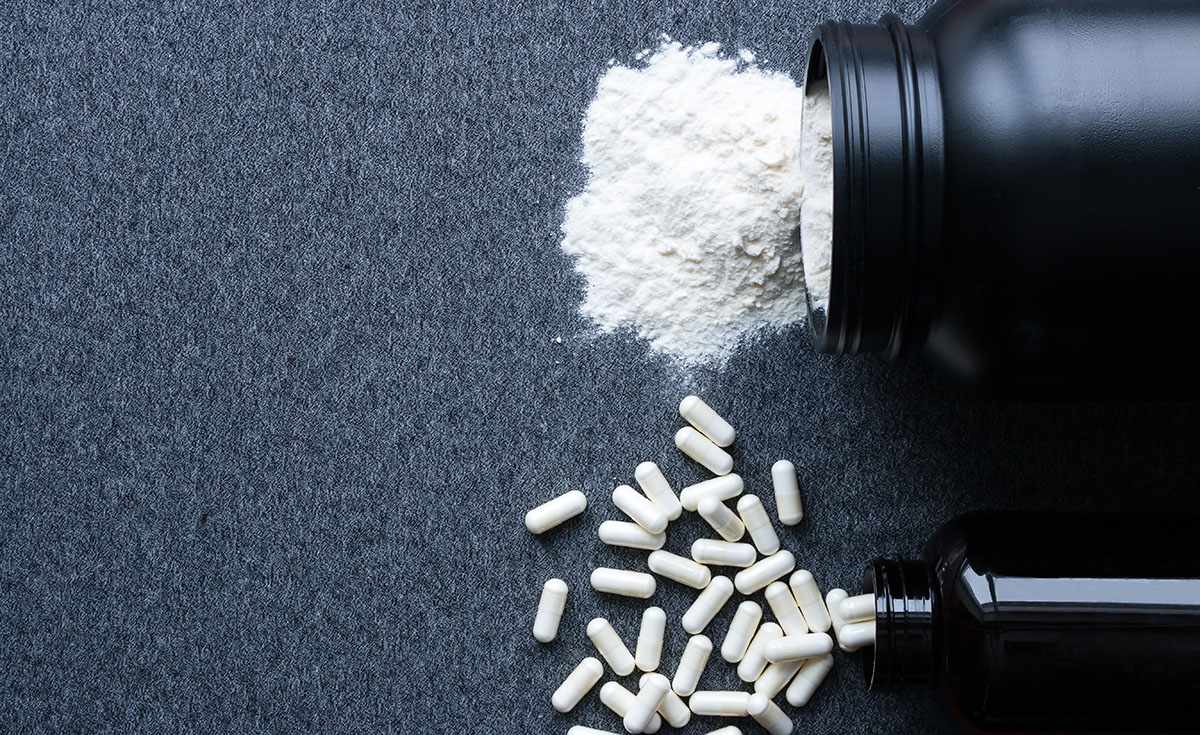If you exercise frequently, you likely want to be certain you’re getting the most from it.
One significant advantage of exercise is gaining strength and muscle. Having a healthy amount of muscle enables you to execute your best during exercise and daily lifestyle.
Three main criteria have to be fulfilled for maximum muscle gain: ingesting more calories than you burn, consuming more calories than you break down and an exercise program that’s challenging to your muscles.
While it’s possible to meet all these standards without taking dietary supplements, certain supplements might help you fulfill your objectives.
The 6 supplements listed below might help you achieve more muscle with your exercise program.

1. Creatine
Creatine is a molecule that is produced naturally within your body. It gives energy for your muscles and other tissues.
However, taking it as a nutritional supplement can increase muscle creatine content by up to 40 percent past its normal amounts.
This impacts your muscle cells and workout performance, boosting muscle gain. In reality, a large amount of research shows creatine improves muscle strength.
This is excellent news if you’re trying to gain muscle. Greater strength permits you to perform better through exercise, resulting in larger increases in muscle mass over time.
Creatine can also raise the water content on your muscle cells. This may cause your muscle tissues to swell slightly and produce signals for muscle development.
Furthermore, this supplement may increase levels of these hormones involved with muscle growth, such as IGF-1.
What’s more, some research indicates that creatine could reduce the breakdown of proteins in your muscles.
In general, many researchers have studied creatine supplements and exercise, and one thing is clear — nourishment helps increase muscle mass.
Creatine has also been studied extensively and has an outstanding safety profile.
If you’re looking for a supplement to help you gain muscle, consider creatine first.
Shop for nourishment supplements online.
SUMMARY: Creatine is probably the single best nutritional supplement for muscle growth. A number of studies have confirmed that it can help increase muscle mass.
2. Protein Supplements
Getting enough protein is critical for gaining muscle.
Specifically, to achieve muscle, you need to consume more protein in the body breaks through natural processes.
As soon as it’s possible to get all the protein you want from protein-rich foods, some people struggle to achieve that.
If it sounds like you, you might want to consider choosing a protein supplement.
There are several different protein supplements available, however, some of the very popular are whey, casein and soy protein. Other protein supplements include protein isolated from eggs, beef, chicken, or alternative resources.
Research demonstrates that adding additional protein via supplements causes slightly more muscle gain in people who exercise than adding extra carbs.
However, the effects are probably larger for people that aren’t getting enough protein in their normal diet.
In fact, some research indicates that consuming very high amounts of protein supplements does not help increase muscle if you’re already adhering to a high-protein diet.
Many people wonder how much protein to consume daily. If you’re an active person trying to gain muscle, 0.5–0.9 g of protein per pound (1.2–2.0 grams per kg) of body fat may be optimal.
Shop for nourishment supplements on the internet.
SUMMARY: Consuming enough protein is absolutely vital for optimum muscle gain. But if you’re getting enough protein in your diet, choosing a protein supplement is unnecessary.
3. Weight Gainers
Weight gainers are nutritional supplements designed to help you get more calories and protein. They are typically used by people who struggle to gain muscle.
Some people find it hard to gain muscle, even when consuming considerable quantities of calories and lifting weights.
Although the calorie contents of fat gainer supplements change, it’s not unusual for them to contain over 1,000 calories per serving.
Lots of people believe these calories come from protein as it is so important for muscle building. But most of the calories really come from carbs.
Additionally, there are 75–300 grams of carbohydrates and 20–60 g of protein per serving of these supplements.
When these products can help you eat more calories, it’s important to realize that there isn’t anything magic about weight gainer supplements.
Some research in physically inactive adults has shown that radically increasing calories can increase lean mass such as muscle, provided that you consume enough protein.
However, research in adults who weight trained indicated that consuming a weight gainer supplement might not be effective for increasing lean mass.
In general, weight gainers are only recommended if you are struggling to consume enough food and you find it easier to drink a weight gainer shake than consume more real food.
SUMMARY: Weight gainers are high-calorie products designed to help you consume more calories and protein. But they’re only recommended if you fight to get enough calories from meals.
4. Beta-Alanine
Beta-alanine is an amino acid that reduces fatigue and might boost exercise performance.
Additionally, beta-alanine may help increase muscle mass if you’re following an exercise program.
1 study showed that taking 4 grams of beta-alanine per day for eight weeks increased lean body mass more than a placebo at school wrestlers and football players.
Another study reported that adding a beta-alanine supplement into a six-week, high-intensity interval training program increased lean body mass by about 1 pound (0.45 kg) more than a placebo.
While more study on beta-alanine and muscle gain is necessary, this supplement can help support muscle gain when combined with a fitness program.
SUMMARY: Beta-alanine is an amino acid that can improve exercise performance. Some evidence indicates that it may also help increase muscle mass in response to use, but more info is needed.
5. Branched-Chain Amino Acids
Branched-chain amino acids (BCAAs) consist of three different amino acids: leucine, isoleucine and valine.
They’re found in most protein sources, particularly those of animal origins like poultry, meat, eggs, fish and dairy.
BCAAs are critically essential for muscle development and make up about 14% of the amino acids in your muscles.
Just about everybody consumes BCAAs from food every day, but it’s also very popular to choose BCAAs as a supplement.
A small amount of research indicates that BCAAs may improve muscle increase or reduce muscle loss, compared to a placebo.
However, other research indicates that BCAAs may not create increased muscle gain in those after a workout program.
It’s very likely that BCAA supplements might only benefit you if you aren’t eating enough high-quality protein in your diet.
Even though they could be advantageous if your diet is inadequate, more info is necessary before BCAAs are recommended as a go-to nutritional supplement for muscle gain.
Shop for BCAA supplements on the internet.
SUMMARY: Branched-chain amino acids are very important for muscle development. They are found in several foods, and it is unclear if carrying them as a supplement is useful when you consume enough protein.
6. HMB
Beta-hydroxy beta-methylbutyrate (HMB) is a molecule that is generated when your body processes the amino acid leucine.
HMB is liable for some of the advantageous effects of protein and leucine from the diet.
It might be particularly crucial for reducing the breakdown of muscle tissues.
While HMB is produced naturally by your body, carrying it as a supplement allows for higher amounts and might benefit your own muscles.
Several studies in previously untrained adults have demonstrated taking 3–6 grams of HMB per day can improve the gains in lean body mass from weight-training.
However, other research indicates that similar doses of HMB are likely not capable of increasing muscle mass in adults with weight training expertise.
This may mean that HMB is the most effective for those that are getting started with exercise or increasing the intensity of their workout.
SUMMARY: HMB may help increase muscle mass in those that are starting a weight training program, but it appears to be less effective for those who have training expertise.
Other Supplements
A lot of different supplements claim to increase muscle mass. These include conjugated linoleic acid, testosterone boosters, glutamine and carnitine.
However, the evidence is mixed.
- Conjugated linoleic acid (CLA): CLA identifies a group of omega-6 fatty acids that exert several effects on the body. Studies on CLA for muscle gain have produced mixed results, and it’s not clear if it is favorable.
- Testosterone boosters: Testosterone-boosting supplements include D-aspartic acid, Tribulus Terrestris, fenugreek, DHEA and ashwagandha. It’s likely these chemicals only benefit those with low testosterone.
- Glutamine and carnitine: All these are likely not capable of increasing muscle mass in middle-aged or young active individuals. However, studies have shown carnitine may have some advantages for muscle growth in the older.
SUMMARY: Many types of supplements claim to improve muscle mass, but there’s not much evidence that they are effective for healthy, energetic people.
The Most Important Thing
Supplements can not provide you with maximum muscle gains if your nutrition and workout programs are lacking.
To gain muscle weight, you want to consume enough protein and calories, in addition, to exercise, ideally with weights. Once your nutrition and workout regimens are in check, you may want to think about dietary supplements.
Creatine and protein supplements are likely the most effective options for muscle gain, but other nutritional supplements might be helpful for certain people.
